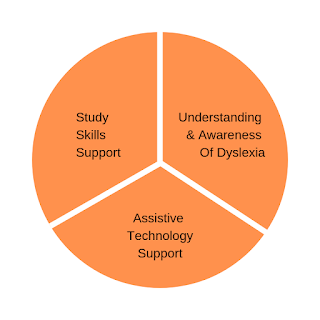How to help students with disabilities overcome anxiety.
In this article, together we are going to explore how to help students with disabilities overcome anxiety.
 |
| Written in partnership with Sonocent. |
context of other disabilities that can present a barrier to learning and as such cause anxiety for the student involved.
"It is our responsibility as advocates for dyslexia to ensure that the next generation of dyslexic children have the opportunity to express their strengths more fully, with greater understanding and support within school and society for their difficulties."
Emeritus Professor Angela Fawcett, Swansea University,
Honorary Professor, Sheffield University
Let us get something clear, dyslexia is classed as a disability. Whilst there is the 'positive dyslexia' movement taking place where there is a positive focus on the strengths that come as a result of being dyslexic, until the primary and secondary education system, as a whole, changes significantly, students with dyslexia will be at a disadvantage because they will be experiencing barriers that get in the way of enjoying and engaging with education.
It is through years of struggling to engage whilst peers exceed in education that students with dyslexia or other disabilities can potentially develop issues surrounding self-belief and thus find that their levels of anxiety become unhealthy.
How am I defining 'disability'?
According to the British Dyslexia Association's website, a disabled person is defined as having a "physical or mental impairment which has a substantial and long-term adverse effect on their ability to carry out normal day-to-day activities." The use of "substantial" is defined as 'more than trivial'.
How am I defining 'anxiety'?
The mental health charity, Mind, explains anxiety as a word that is used "to describe feelings of unease, worry and fear." Anxiety incorporates both the emotions and the physical sensations we might experience when we are worried or nervous about something. It is our normal biological reaction to feeling threatened being related to our 'fight or flight' response.In their excellent ebook, "Understanding Anxiety and Panic Attacks" , there is one quote that really resonates strongly with my own experience of neurodiversity and many of my clients who I coach:
"For me, anxiety feels as if everyone in the world is waiting for me to trip up, so that they can laugh at me. It makes me feel nervous and unsure whether the next step I take is the best way forward."
So we can see that anxiety is something that can really effect the progress of a child or young person through education, but it is something that is grossly misunderstood. As we lead our lives we all have a level of anxiety which plays a part in helping us to judge risk or keep safe. It is seen as a 'Window of Tolerance' where there is a balance between feeling emotions but still being able to judge risk objectively.
For example, if I am walking down a road and I come across a group of people who are shouting loudly, I might decide to cross the road to avoid trouble. At that moment my normal level of anxiety is triggered but I can tolerate the resultant emotions that take place and still take in information and make an objective decision on the action I need to take to keep safe.
When faced with real danger such as walking down a street and coming face to face with a tiger (it happens all the time in Cambridge where I live....) then my level of anxiety will shoot up and I will choose to either fight or flight (probably choose flight) or I might find myself freezing which will have a detrimental effect on my safety (but quench the hunger pangs of said tiger ).
The following diagram is useful in picturing this:
 |
| With thanks to https://worthit2bme.com/fightflightimmobolize/therapeutic-window-of-tolerance/ |
So anxiety is a problem for students with a disability when they are finding their level of anxiety always working at an extreme level.
How To Help Students With Disabilities Overcome Anxiety?
So here is the reality, you can't overcome anxiety, you can only put efforts in place to regulate it. It would be dangerous to live life without a normal level of anxiety.
So in understanding more about anxiety, the problems seem to lie more with having a constant negative stimulus that makes students anxious and if a student is unable to move back to a normal level of anxiety then it simply develops in an unhealthy direction.
I would like to recommend three tips for helping a dyslexic (or disabled) student to lower their level of anxiety so that they can remain within the 'Window of Tolerance' and be able to function in a way that makes attainment successful.
1) Show some empathy NOT sympathy!
When we talk to someone who is anxious we will get a sense of how they feel from their body language and the way that they talk.
Obviously, no one likes to see someone in any emotional distress, but so often we can take the part of being a sympathiser and we do that because we care but this isn't always helpful.
When we sympathise with someone we automatically shift a balance of power between the sympathiser and the sympathised. Somehow the anxious student who is experiencing a psychological need starts to find that the level of need has been amplified as we treat them as needy and perhaps not equal. Maybe we start to try to find solutions to help the student rather than empower them to find their own solutions knowing that you have their back!
Many therapeutic counsellors will not make suggestions on how to fix or deal with emotional pain, they empower their clients to find the solutions themselves. Indeed according to the National Counselling Society's Code of Ethics it is encouraged to respect the autonomy of clients. Putting it another way, if we just sympathise with someone who is suffering from anxiety we fail to demonstrate that we believe in the student's ability to make decisions that can help them to live a healthier and less anxious life.
If we can start to put ourselves in the shoes of the dyslexic students (empathise) that we support, whether you are a parent or teacher, then we empower them to find strategies for change, self-advocate for their need and ultimately be more successful. Long term strategies work when the person using them feels empowered to use them.
2) Signpost the student to resources that help reduce levels of anxiety.
With reference to point one, I am advocating that we give the power to change to the student. We give them the power to make their own decisions about what they need to help reduce that level of anxiety but this doesn't mean that we can't keep them informed about resources that they may not know about.
In most educational establishments there should be some kind of pastoral support in place that the student should be made aware of. At undergraduate level, this tends to be located at Student Services (or similarly named department). These organisations can inform the student of resources that are available not only for support with their emotional challenges but also for study skills which can open up a world of resources that include study skills coaching and technology that enables the student to study more effectively (more in the next section).
It is a bit trickier at secondary and sixth form levels to get the right support in place as each organisation do things differently but the student should be encouraged to speak with their SENCO and year manager and of course have the option of you (if you are the parent) being in those meetings. At this level of education, a student will probably be at their highest level of anxiety as the work ramps up after primary education. They won't necessarily be aware that they are entitled to ask for support for their dyslexia (it is a legal right) and so as such might feel a little dis-empowered.
There is value in helping a child to open up about what they are feeling and let them lead in what they feel they need with the parents giving them a supportive hand and being prepared to proactively work with schools and colleges to get the right support in place.
3) Give them the tools and strategies that they need to be successful in their attainment.
In a recent blog article, I shared the following diagram that illustrated what I believed were essential elements for helping a student boost motivation and confidence. |
| Essential elements for boosting confidence and motivation for students. |
Having confidence and motivation generally means that the level of extreme anxiety in life will be reduced.
Anxiety comes from a feeling of being unsure in situations. It is important that our students can feel more sure about what they are doing with respect to dyslexia (disability) and studying. This means having the right ingredients in place for success and in the diagram above, I believe that the three elements of study skills support, experiencing understanding and awareness of dyslexia as well as getting assistive technology support will help with bringing those extreme levels of anxiety into that 'Window of Tolerance' sweet spot that enables a student to flourish.
A useful website is the DSA-QAG (Disabled Students Allowance Quality Assurance Group) which an undergraduate student can use to find out who to contact to get a needs assessment for studying and recommendations for assistive technology support.
Again, this is not so easy at secondary and sixth form level as schools have varying levels of funding available to support this, but funding is available from the Local Authority and it is advisable for parents to look into getting an Education Health and Care Plan (EHCP) assessment.
 |
| Download this useful resource today. |









Students should know about the other people who have more disabilities from them. They have someone to motivate them and garage door Installation MA they have their other abilities more that normally person.
ReplyDeleteThe article looks magnificent, but it would be beneficial if you can share more about the suchlike subjects in the future. Keep posting. family counselling
ReplyDeleteGreat post! You select a very good topic for writing. You discuss related to reduce the student disabilities. I like your post. Moreover, commercial cleaning company Dallas tx provide the best and affordable cleaning services.
ReplyDelete